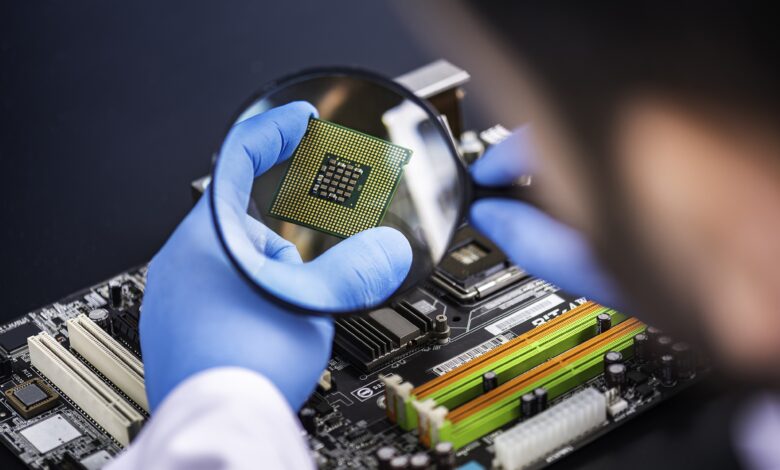2 Artificial Intelligence (AI) Chip Stocks to Watch That Aren’t Nvidia

Don’t count AMD and Intel out just yet.
Artificial intelligence (AI) has been dominating the news cycle as a technological arms race has kicked into high gear. Microsoft (NASDAQ: MSFT) led the pack early with its investment in AI pioneer OpenAI, but Alphabet (NASDAQ: GOOGL) (NASDAQ: GOOG), Meta (NASDAQ: META), and the rest of big tech have all made their own forays into AI, with varying degrees of success.
No company, however, has had as successful an AI run as Nvidia (NASDAQ: NVDA). The semiconductor giant designs and sells the graphics processing units (GPUs) that allow most power-hungry AI applications to function. They have become the industry standard due to their speed and efficiency. The chipmaker is now the third-largest company in the world by market capitalization after its stock rose nearly 200% in the last year.
Investors are excited by Nvidia’s recent announcement about its next-generation AI chips, the Grace Blackwell “superchips.” The first iteration, the GB200, will allow for a 25-fold decrease in power consumption and 30-fold speed increases in some AI applications compared to its predecessor.
Room for more?
Although Nvidia dominates AI semiconductors and is likely to continue to do so, it is not the only player. Analysts predict the market will be massive. According to estimates by Grand View Research, the AI market will exceed $1.8 trillion by 2030, with a compound annual growth rate (CAGR) of 37.3%. The AI arena will only benefit from competition, and many companies stand to see significant growth. Here are two that deserve a spot on investors’ watch lists.
AMD
Shares of Advanced Micro Devices (AMD 1.33%) have lagged Nvidia’s gains, but in this market, all things are relative. The returns have still been impressive: The stock is up more than 72% in the last year.
HSBC analyst Frank Lee believes AMD will capture 10% of the AI GPU market in 2025, representing $12.3 billion in sales for the company. That would be massive growth. In 2023, the company reported $6.5 billion in revenue for its data center segment, which houses its AI chips.
A major concern is AMD’s ability to compete with the GB200. Some have pointed out that the company’s premiere AI GPU, the MI300, isn’t as impressive. However, AMD intends this to be a competitor of Nvidia’s current iteration of chips and will likely announce an updated, more powerful chip to compete directly with the GB200. However, at this point, this is just conjecture. AMD may fail to offer something on par with the GB200 or Nvidia may be on to its next iteration before it does.
But it’s definitely worth watching what AMD comes up with.
Intel
Until the advent of AI, Intel (INTC 1.77%) was the reigning king of semiconductors. However, the company’s specialty has been central processing units (CPUs) rather than GPUs. CPUs are more all-purpose than GPUs, which excel at specific tasks, and are still the standard in many devices like laptops.
As a result, Intel has missed out on much of the AI wave. Its stock is up a more modest 17% in the last year. Intel is not planning on sitting idly by, however. The company recently announced the newest iteration of its AI-specific chip, the Gaudi 3. Intel claims the chip will deliver “50% faster time-to-train” for some AI applications and 40% more power efficiency than Nvidia’s H100. This is a big win for Intel, but it remains to be seen how Gaudi 3 stacks up against the HB200.
Intel is also pushing what it calls “AI everywhere.” It’s releasing the company’s fifth-generation Xeon CPUs, which will include “AI acceleration” in every chip. CPUs can still power some AI applications, and these will be some of the most powerful on the market. AI investors will want to keep an eye on Intel.
Investor takeaway
Although it’s likely Nvidia will continue to dominate the market, AMD and Intel both stand to see significant growth if they can capture just a fraction of it. Given both companies’ long histories of success and the sheer size of the market, this is more than likely, making them worth a look.
Johnny Rice has no position in any of the stocks mentioned. Randi Zuckerberg, a former director of market development and spokeswoman for Facebook and sister to Meta Platforms CEO Mark Zuckerberg, is a member of The Motley Fool’s board of directors. Suzanne Frey, an executive at Alphabet, is a member of The Motley Fool’s board of directors. The Motley Fool has positions in and recommends Advanced Micro Devices, Alphabet, Meta Platforms, Microsoft, and Nvidia. The Motley Fool recommends Intel and recommends the following options: long January 2025 $45 calls on Intel, long January 2026 $395 calls on Microsoft, short January 2026 $405 calls on Microsoft, and short May 2024 $47 calls on Intel. The Motley Fool has a disclosure policy.



